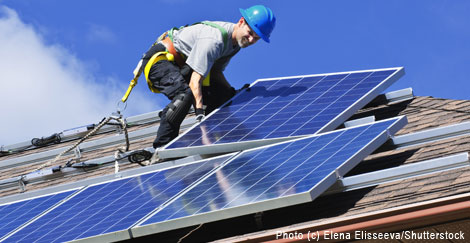|

We All Have Green Work to Do
By Wendy Priesnitz
All of a sudden “green jobs” have become the rallying cry for those concerned about the world’s ecological and economic health as the savior that will replace the jobs lost during this period of change in the world’s economy while simultaneously fixing the climate change problem. Activists, politicians, educators, venture capitalists, union leaders, corporate CEOs, and the media alike are singing the green jobs tune with fervor. Unfortunately, the term – like its companion “green economy” – has no formal definition. The stereotypes involve renewable energy, organics, and the like. But what about the driver of the conventional diesel truck that delivers wind turbine components from one factory to another: Is her job green? Or what about the steelworker who helps manufacturer one of the main component materials of a wind turbine? Is his job green?
The United Nations Environment Program defines green jobs as “work in agricultural, manufacturing, research and development (R&D), administrative, and service activities that contribute substantially to preserving or restoring environmental quality. Specifically, but not exclusively, this includes jobs that help to protect ecosystems and biodiversity; reduce energy, materials, and water consumption through high-efficiency strategies; de-carbonize the economy; and minimize or altogether avoid generation of all forms of waste and pollution.”
But I think that definition, while a good beginning, is lacking in vision and provides fodder for greenwashing, which can lead to public skepticism and eventual irrelevance. The goal must be to make every job green, since each and every one of us has a personal responsibility to preserve and regenerate the Earth, no matter what our job description. Further, the definition of a green job must encompass not only environmental issues but social justice, human rights, professional ethics, and cultural diversity. In short, we need to accompany the environmental responsibility that is inherent in the concept of “sustainability” with ethical responsibility.
The idea of sustainability was put onto the public agenda when the United Nation’s Brundtland Commission published its report Our Common Future in 1987. It defined sustainable development as meeting “the needs of the present without compromising the ability of future generations to meet their own needs.” As much as there seemed to be international buy-in to the desire to grow without damaging future generations’ prospects, economic sustainability was not part of the equation.
Fortunately, the interconnectedness of social, environmental, and economic spheres was recognized as the “triple bottom line” in the late 1990s by author and corporate responsibility guru John Elkington. He realized that business goals are inseparable from the societies and environments within which they operate, and that a failure to account for social and environmental impacts makes economic gain unsustainable and vice versa. The UN has now embraced “people, planet, profit” and that philosophy has become the dominant approach to full-cost accounting.
All of that has remained the domain of academics, environmental organizations, and the odd entrepreneur interested in something called “Corporate Social Responsibility.” A few educational institutions are teaching the triple bottom line and exploring the need for environmental and economic transparency. Nevertheless, preparing oneself for a green job seems to be as difficult these days as finding one. An article in The New York Times highlighted a concern among employers and job recruiters that business schools are turning out graduates with a limited understanding of ethical and social considerations, let alone environmental ones.
But, today, we find ourselves having hit the ecological, economic, and ethical walls all at the same time. And that has got our attention. It remains to be seen how we will work ourselves out of the mess, how many green jobs will be created and how people will train for them. But I do know that more people than ever before have a sense of the impact their actions have on the world. So I continue to have hope for a sustainable future – where capitalism and consumerism do not cause human suffering, and where individuals take responsibility for discontinuing and cleaning up environmental and economic devastation.
Wendy Priesnitz is the co-founder and editor of Natural Life Magazine, where an earlier version of this appeared as an editorial in 2009. She is also the author of 13 books and a contributor to many more.
|

